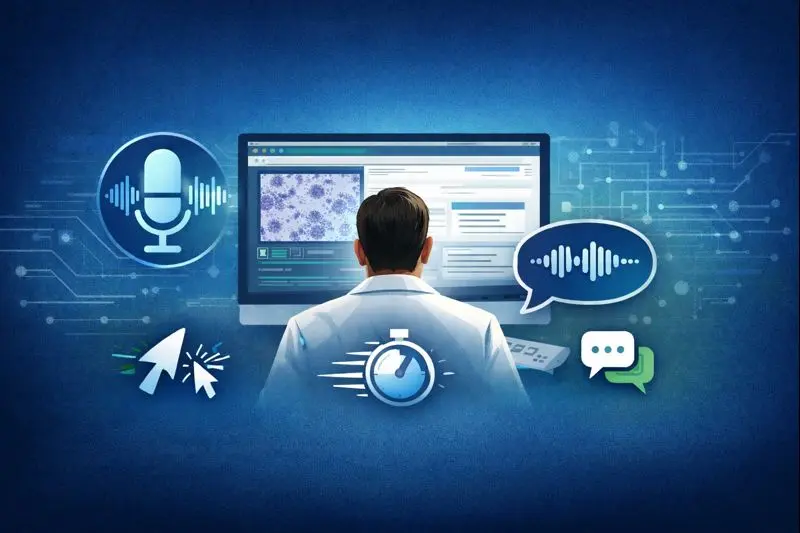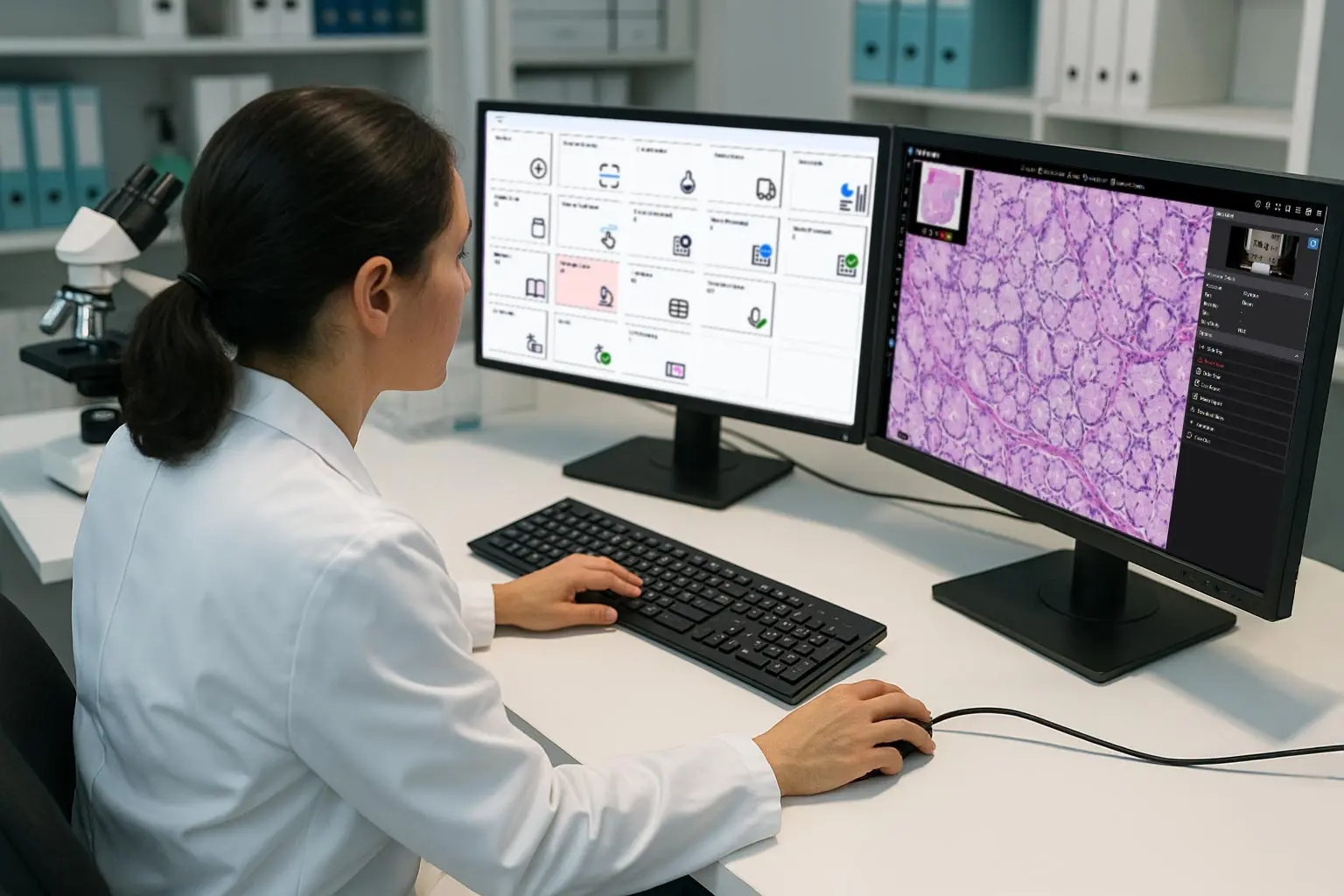Blog
LigoLab Delivers the LIS System Interoperability Needed to Transform Medical Laboratories into Thriving Businesses
October 31, 2025
In today’s highly competitive environment, independent clinical laboratories and pathology groups need every possible advantage. From an interoperability standpoint, this requires a laboratory information system (medical LIS software) that provides seamless connectivity with all instruments, devices, electronic health record systems, and third-party tools such as laboratory billing/lab revenue cycle management (lab RCM) software.
If your current laboratory information system lacks this capability, or if the LIS lab vendor behind your pathology lab reporting software overcharges and delays support when issues arise, it may be time to question whether that partnership still serves your lab’s best interests.
Industry Insights: Empowering Laboratories - The Benefits of Full Agency Over LIS System Configuration
Laboratory Information System Software and a Powerful Interface Engine
Let’s face it. Laboratory interfaces are typically difficult and time-consuming, but that doesn’t have to be the case. With LigoLab, it’s not.
LigoLab’s unified medical LIS and lab RCM informatics platform includes a proprietary, built-in interface engine that delivers true interoperability across all departments and workflows, from pathology to clinical operations. This essential component eliminates manual data entry and the risk of associated errors, reduces staffing needs, and drives growth by improving efficiency and productivity. The result: higher margins, expanded services, and more satisfied clients.
LigoLab’s interface engine exemplifies how forward-thinking laboratory information system companies can deliver the end-to-end connectivity today’s labs demand, while also taking full ownership of both technical and financial operations. By integrating laboratory billing directly within the same platform, LigoLab eliminates redundant laboratory software systems and data silos, creating one seamless and intelligent environment for total clinical laboratory management.

All File Formats and Levels of LIS System Customization Supported
“If an electronic device can be interfaced, we can connect to it,” said Gor Kalantaryan, LigoLab’s Chief Operating Officer. “Our interface engine supports every integration requirement, from EHRs and laboratory billing systems to instruments and beyond.”
Beyond HL7 connectivity, LigoLab’s interface engine supports data exchange through FHIR, XML, X12, CSV, PDF, Flat File, ASTM, and RESTful API formats. Backed by a skilled interface team with deep expertise in advanced LIS software solutions, the engine also offers multiple levels of integration services to meet the unique needs of every laboratory.
“We can support any level of interface customization,” said Kalantaryan. “A core part of LigoLab’s mission is to deliver a complete, all-in-one LIS software with embedded laboratory billing solutions for our customers and their clients. We can fully manage all interface services, provide IT departments with direct access to our interface engine to build their own connections, or offer a hybrid model where the customer’s team handles common interfaces and we take care of the more complex ones. There’s even a fourth option; LigoLab can integrate with an external vendor that manages the interfaces directly.”
Whatever the requirement, the LigoLab platform provides far greater operational flexibility than traditional laboratory information systems, enabling labs to exchange and display data exactly as intended.
For customers, the platform serves as the core of their operations, with the LIS system acting as the engine that drives efficiency and scalability. Its integrated features and open, vendor-agnostic architecture simplify tasks that were once slow, manual, and error-prone.
Unfortunately, most pathology LIS systems on the market today fail to keep pace with the evolving needs of modern medical laboratories.
“Today’s labs have highly specialized operations that off-the-shelf laboratory information systems simply can’t support,” said Kalantaryan. “They often lack affordable customization options and flexible interfaces.”
Industry Insights: Laboratory Information Systems and the Key Role They Play in Lab Data Analytics
Laboratory Information System Interfaces - A Smooth and Painless Process
For many laboratories, working with legacy LIS systems to build interfaces has been an exhausting and frustrating experience, often discouraging them from trying again. With LigoLab’s platform, however, that hesitation quickly disappears. Its robust interface and customization capabilities make the process far smoother and the overall operation more efficient.
“When we first meet with new clients, they often describe how painful their previous interface projects were,” continued Kalantaryan. “With LigoLab, that experience is completely different. Thanks to the flexible design of our LIS software platform and the expertise of our interface team, projects that once took months can now be completed in just days, or even hours.”
Discover More: Comparing the LigoLab Informatics Platform with Legacy Laboratory Information System Software

A Dedicated Interface Team That Puts Customers First
Most laboratory information system vendors build LIS software that only meets the general needs of labs as a whole. They overlook the fact that every laboratory, hospital, and clinic has unique operational requirements, workflows, and patient populations. Recognizing this, LigoLab created a dedicated interface team to provide development, user training, and ongoing support, a level of commitment that sets it apart from other LIS lab vendors.
“Our dedicated team of interface professionals responds to every customer request immediately,” said Dean Anyaocha, LigoLab Interface Project Manager. “We also stay in constant communication throughout the entire process.”
At LigoLab, the average interface project takes just four to six weeks, with regular updates provided weekly. This level of responsiveness is rare in the industry, where some labs wait weeks for replies from their LIS software vendors.
Another key differentiator is LigoLab’s ability to approach interface development from both a technical and business perspective. When submitted specifications are incomplete, the team proactively offers recommendations to ensure nothing is overlooked.
“Our priority is helping clients achieve the best possible LIS system performance and lab workflow. If that requires extra effort on our part, we’re happy to do it,” added Anyaocha.
That customer-first mindset extends well beyond implementation. Even after an interface goes live, LigoLab’s team of experts continues to monitor and maintain it, performing regular health checks to prevent downtime and ensure consistent performance.
By prioritizing service, communication, and proactive support, LigoLab empowers laboratories to scale efficiently, modernize operations, and grow their businesses with confidence.
Discover More: What You Need to Know Before Contracting with a Laboratory Information System (LIS) Company
Flexible Laboratory Information System LIS Solutions for All Labs
As a comprehensive, enterprise-grade LIS laboratory information system platform, LigoLab distinguishes itself in today’s competitive pathology lab management market.
This all-in-one platform combines comprehensive laboratory information system functions within a single, unified ecosystem. It features fully integrated modules that support anatomic pathology, clinical pathology, molecular diagnostics, lab revenue cycle management, and direct-to-consumer lab testing workflows. Each module operates on a cohesive, highly configurable LIS software architecture designed to support every department, role, and case type, delivering a truly centralized solution for complete laboratory management.
Discover More: Reduce Denials and Stop Revenue Leakage With Integrated Laboratory Billing Management
LigoLab’s comprehensive LIS software solution includes advanced features such as specimen barcoding and sample tracking, a detailed and searchable audit trail, compliance checks at every stage, flexible rules and automation engines, and fully customizable reporting with multiple delivery options. The platform is available through competitive tiered pricing designed to meet the needs of laboratories of all types, sizes, and complexities.
Discover More: LigoLab’s New Tiered Pricing Model for its LIS Platform Delivers a Tailored Fit and Maximum Value
To discover how LigoLab’s advanced pathology reporting software and LIS interface capabilities can immediately enhance your laboratory’s efficiency and connectivity, contact one of our LIS system specialists to schedule a demonstration or a short introductory call.
Don’t Wait: Contact a LigoLab Product Specialist Today!






